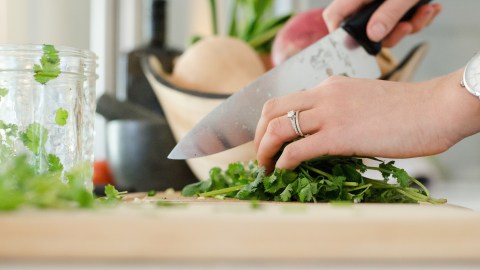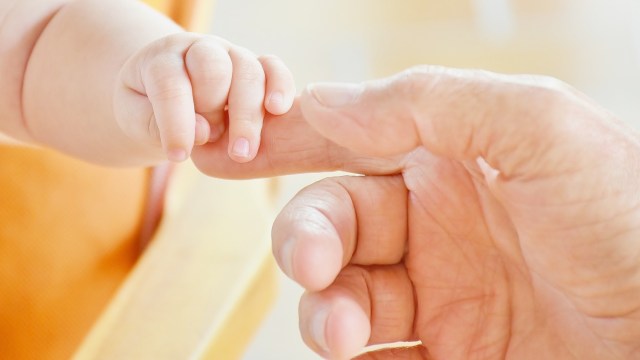The surprising benefits of cooking as a life skill

Photo by Alyson McPhee on Unsplash
- It’s easy to outsource our cooking to professionals, but in so doing, we lose a fundamental skill, control over our nutrition, and an exercise that promotes out physical and mental health.
- Even if you’ve never cooked anything beyond grilled cheese, improving your cooking skills can seriously improve your quality of life.
- Learn about the benefits of learning to cook as well as some resources to help you along the way.
Few things are as difficult to categorize as cooking. What else can be called a skill, an art form, a science, and a survival tool at the same time? It’s an activity that brings people together over the dinner table, but the act of cooking can also be a very private experience. It’s a human adaptation, a clever trick that evolution gradually baked into our brains to conjure up more calories out of raw food to power the large brains that could, with any luck, come up with more clever tricks. It’s something so fundamental that everyone knows how to do it to some degree, but only a few can master the practice after years of training. It’s a life skill that can save you money, improve your mental and physical health, and attract the envy of your peers all at once. Here’s why.
Cooking can save you money
When we look at the physiological changes that occurred to our ancestors, such as changes in their molar and body sizes, it seems as though human beings began cooking food about 1.9 million years ago. That’s quite a long and storied history just for us to heat up Cup Noodles for every third meal.
Aside from not letting the cumulative knowledge of our ancestors go to waste, one of the major reasons to learn to cook is financial. According to a Pricenomics study, ordering delivery costs an average of $20.37. In comparison, making a home-cooked meal costs just $4.31. That’s more than five times as expensive.
Despite this common knowledge, however, Americans still spend a significant chunk of change on food prepared outside the home. In 2017, Americans spent $3,365 a year on food prepared away from home. When you consider that only 39% of Americans have $1,000 or more in savings, this in and of itself is a pretty compelling reason to start cooking more. Of course, not everybody needs to worry about their finances. Some people have the money to spend, but there are still plenty of reasons to learn to cook aside from the financial one.
Eating out puts your health in jeopardy
It’s no secret that cooking at home is healthier than eating out. Those delicious, professionally prepared meals really only taste so good because they’re loaded with butter and salt.
One study examining chain restaurants in Philadelphia found that the average meal (defined as an entrée, side dish, and a small appetizer) contained nearly 1,500 calories. What’s more, these meals contained 28 grams of saturated fat and 3,512 milligrams of sodium. Adults are only meant to consume at most 13 grams of saturated fat per day and 2,300 milligrams of sodium per day. Not only does eating out offer sub-par nutrition, but it also doubles your chances of catching a food-borne illness.
Meanwhile, a systematic review of 28 research studies found that adults who cooked at home had more energy, consumed less sodium, ate more fruits and vegetables, and consumed more fiber. As you might expect, improving your diet in this way is good for your health. Research has shown that close to half of all cardiometabolic deaths (e.g., heart disease, diabetes) are attributable to poor diets, and 20% of all deaths worldwide are linked to poor diets, which even beats smoking as a mortality risk.
Cooking’s many psychosocial benefits
Cooking is both a biological necessity and a behavioral script that’s been hardwired into our brains over the course of nearly two million years. As an example, a systematic review of the impact of cooking interventions on mental health found a number of positive outcomes. Study participants who engaged in baking sessions developed better self-esteem as a result of their improved concentration, coordination, and confidence. The participants also reported that one of the most satisfying aspects of the baking process was being able to produce a product that they could give away to others. The other studies in the review showed similar results; cooking raised self-esteem.
Cooking also improved positive affect — a term psychologists use to refer to the experience of emotion — and reduced negative affect. In addition, the review found that cooking improved overall well-being and health-related quality of life, primarily due to the nutritional benefits that cooking provides. Good nutrition and mental health are intimately related, so this finding should come as no surprise.
Resources
One of the intimidating things about learning to cook is that it requires an awful lot of skill, assuming you want to eat something tasty as well as healthy and cheap. Here’s some resources that can help bring your cooking game to the next level.
1. The Joy of Cooking
The Joy of Cooking is arguably the classic cookbook. It’s been in print since 1936 and has sold over 18 million copies for good reason. Though it’s gone through many iterations over the years, it was first crafted at the very beginning of the Great Depression by Irma Rombauer, and its recipes are commensurately designed to encourage healthy, tasty, and cheap eating. That being said, make sure to do some research on which edition is the right one for you as it has changed considerably over its long history. If you’d rather not do the research, odds are you’ll do just fine by borrowing whichever edition your parents used, and you’ll likely gain some sense memories of childhood meals to boot.
2. The Essentials of Cooking
While there’s no shame in following recipes line by line, it’s a slow way to become a better cook. The Essentials of Cooking focuses on the basic techniques of cooking instead, providing readers with a cooking skillset to improvise and craft their own meals.
3. Mastering the Art of French Cooking
French cuisine is stereotyped as refined for good reason, although it is perhaps a bit buttery. Mastering the Art of French Cooking is a classic cookbook crafted by the quintessential celebrity chef, Julia Child and two other chefs who studied at Le Cordon Bleu. For those of you who want to craft those special dishes a step above your daily dinner, this is the book for you.
There is a slew of quality cookbooks out there, so don’t feel as though you must acquire one of these three. Some may be more interested in books focusing on vegetarian dishes or books that focus on the basics exclusively. If it feels like there’s just too much information out there, don’t get discouraged. Just experimenting with what you have in your kitchen or working out a recipe you found online is the best way to get started honing your cooking skills.





